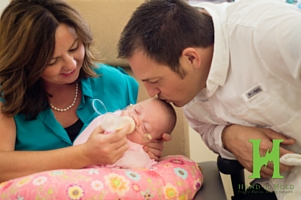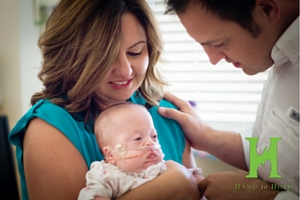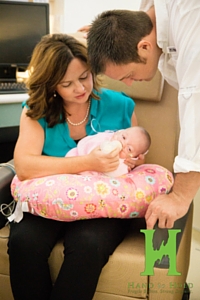The day after my son William died, my husband and I went to the hospital to see his twin Elliott in the NICU. We had agreed that being near Elliott would be the only thing that would feel ok that day. We were both mostly silent. I remember feeling very otherworldly, very distant from the reality that was spinning, beeping, screaming around us, very distant from John. Everything seemed to have a cold fog around it, embodying the environment. There was this watery, grey feeling like nothing was really there, including me. The only comfort was staring at sweet Elliott under the bili lights, waiting for the quick moments when the nurses would do his cares and we would briefly be able to look into each other’s eyes (or at least I could gaze into his).
The nurse practitioner who was on shift that day came over to John and I, and related how sorry she was about William’s passing. With tears in her eyes, she told us that Elliott, so far, was doing well for his gestational age. And then she turned to us, making eye contact. She told us that she believed we would make it through this together, that our relationship was strong, that even though many families don’t make it through in one piece, she thought we would be one of the few to make it.
The prospect of the fact that some families don’t make it through the NICU in one piece made itself known to us.
 Despite the fact that in our culture partnerships often put their best faces forward through social media, in reality many couples struggle finding common ground. Add to that a major traumatic event like the preterm birth of a baby, neonatal loss, or complex medical issues in a new infant, and I daresay that most relationships are thrown violently off of the course the individuals within it expected to keep. Even the strongest relationship can’t move through a crisis completely unscathed. I want to clarify that even though I cited a story from our personal narrative that had to do with the loss of one of our sons, that it doesn’t mean that if you didn’t go through infant loss as a family that your experience was not difficult.
Despite the fact that in our culture partnerships often put their best faces forward through social media, in reality many couples struggle finding common ground. Add to that a major traumatic event like the preterm birth of a baby, neonatal loss, or complex medical issues in a new infant, and I daresay that most relationships are thrown violently off of the course the individuals within it expected to keep. Even the strongest relationship can’t move through a crisis completely unscathed. I want to clarify that even though I cited a story from our personal narrative that had to do with the loss of one of our sons, that it doesn’t mean that if you didn’t go through infant loss as a family that your experience was not difficult.
No NICU stay is “easy”.
Furthermore, navigating a crisis is difficult. Navigating it with another person can feel impossible.
Unfortunately, relationship challenges are another “gift” of the NICU experience that most families have to cope with. If you find yourself struggling in your relationship with your partner during or after the NICU, remember that you are not alone. Remember, too, that it is possible to get through this together, and that many, in the healing, grow significantly stronger relationships with their partner after having gone through trauma together.
If you’re coping with the NICU experience– at any phase of it (currently hospitalized, recently discharged, months– even years– after discharge, etc.)– here are a few tips for integrating healing practices into your relationship with your partner:
- Make it an intentional practice to be gentle in your day to day with your partner. Ultimately, it helps the most when you have already established respectful communication with your partner before a crisis. However, since no one can predict when they will be facing a NICU journey, making an effort to establish this with your partner is essential. What this does: it creates a basis for communication that is respectful, trusting, and kind.
- Intentionally create a space to process the crisis together. During a crisis, many of us have the tendency to shut down, or revert to coping techniques that may have helped us in the past that might now shut out our partner. Thus, it’s important to be mindful that manifesting a space to talk and listen to each other is a deliberate act, and not something to let go by the wayside. This can include spending time together (walks, dinners, etc.), but it also includes those small moments of connection: checking in, talking about how things have been (even through email or text), giving reassurance to your partner, even setting aside 10 minutes to chat about how things have been for each of you. In fact, these little things can, in the long run, add up to more strength for a couple than the bigger “events” like dinner, etc. What this does: it creates a time for each partner in a relationship to feel “held” during a crisis, and to be heard. Incidentally in the case of NICU parents who are, of course, new parents as well, it establishes moments during which parents can check in with each other that can, with time, become regular practice throughout the exhausting period of the infancy of your child.
- Identify outside helpers and your team of support, even professional support. By deliberately noticing who are the member’s of your family’s “team”, parents can make more of a space to nurture their relationship through a crisis. Do you have a micropreemie who has been in the NICU for a month and will likely be there for at least another week? Perhaps setting aside an evening during which your baby’s primary nurse is on shift to watch a movie and have dinner would give a much needed “breather” for your relationship. Has it been overwhelming to create a space to connect with your partner after discharge from the NICU? I can’t emphasize enough how helpful it can be to have a skilled therapist counsel you through your experience. Try to revolt against the isolation that crisis can bring. In doing so you may be able to massively strengthen your relationship. What this does: In enlisting the help of others: family, friends, and caring professionals, you can reestablish your value and care for each other as partners. It takes away the burden of being “one [couple] against the world” and acknowledges that with the NICU experience, you are facing an inordinate amount of stress as a couple. It can be difficult on quarantine to trust another person to watch your baby while you spend time together, however, endowing value in your relationship will repay your family tenfold. Try to focus on finding at least one person you can trust; particularly if you are noticing challenges in your partnership.
 Finally, it’s important to remember that coping with relationship challenges during or after the NICU experience is incredibly common; it’s also important to remember that having very serious trauma play a role in your relationship is not a death sentence to your partnership. In fact, there have been a couple of studies reflecting that the common-knowledge idea that many NICU parents’ marriages end in divorce is quite simply not true. Manifesting a space to heal together as partners can make your relationship fantastically strong, if different from what you had expected as a family.
Finally, it’s important to remember that coping with relationship challenges during or after the NICU experience is incredibly common; it’s also important to remember that having very serious trauma play a role in your relationship is not a death sentence to your partnership. In fact, there have been a couple of studies reflecting that the common-knowledge idea that many NICU parents’ marriages end in divorce is quite simply not true. Manifesting a space to heal together as partners can make your relationship fantastically strong, if different from what you had expected as a family.
Care to share? How did your NICU experience impact your relationship?

